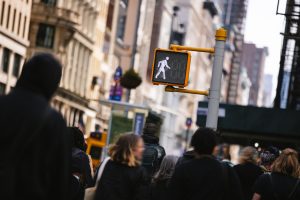 Pedestrian safety is critical whether you are driving or walking on the sidewalk. We each have a responsibility to keep each other safe. Here are some safety tips for drivers that will keep themselves and pedestrians safe:
Pedestrian safety is critical whether you are driving or walking on the sidewalk. We each have a responsibility to keep each other safe. Here are some safety tips for drivers that will keep themselves and pedestrians safe:
- Look out for pedestrians everywhere at all times
- Use extra caution when driving in hard-to-see conditions, such as nighttime or bad weather
- Slow down and be prepared to stop when turning or otherwise entering a crosswalk
- Yield to pedestrians in crosswalks and stop well back from the crosswalk to allow other vehicles to see the crossing pedestrians so they can stop too
- Never pass vehicles stopped at a crosswalk. There may be people crossing where you can’t see
- Never drive under the influence of alcohol and/or drugs
- Follow the speed limit, especially around people on the street, in schools, and in neighborhoods where children are present
- Be extra cautious when backing up and look for pedestrians
Here are some safety tips for pedestrians:
- Follow the rules of the road and obey signs and signals
- Walk on sidewalks whenever they are available
- If there is no sidewalk, walk facing traffic and as far from traffic as possible
- Cross streets at crosswalks or intersections. Look for cars in all directions, including those turning left or right
- If a crosswalk or intersection is not available, locate a well-lit area where you have the best view of traffic. Wait for a gap in traffic that allows enough time to cross safely and continue watching for traffic as you cross
- Watch for cars entering or exiting driveways, or backing up in parking lots
- Avoid alcohol and drugs when walking as they impair your abilities and your judgment
Taking the proper precautions whether you are a driver or pedestrian is for your safety and the safety of others.
If you or anyone you know is injured due to a car accident, make sure to call 911 right away. Each day Jamaica Hospital Medical Center’s Level 1 Trauma Center treats a high volume of motor vehicle collision injuries in New York City. To learn more, please call (718) 206-6000.
All content of this newsletter is intended for general information purposes only and is not intended or implied to be a substitute for professional medical advice, diagnosis or treatment. Please consult a medical professional before adopting any of the suggestions on this page. You must never disregard professional medical advice or delay seeking medical treatment based upon any content of this newsletter. PROMPTLY CONSULT YOUR PHYSICIAN OR CALL 911 IF YOU BELIEVE YOU HAVE A MEDICAL EMERGENCY.
